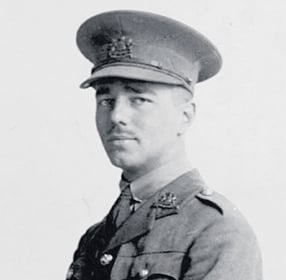Winter Song
The browns, the olives, and the yellows died,
And were swept up to heaven; where they glowed
Each dawn and set of sun till Christmastide,
And when the land lay pale for them, pale-snowed,
Fell back, and down the snow-drifts flamed and flowed.
From off your face, into the winds of winter,
The sun-brown and the summer-gold are blowing;
But they shall gleam with spiritual glinter,
When paler beauty on your brows falls snowing,
And through those snows my looks shall be soft-going.
This poem is in the public domain. Published in Poem-a-Day on December 30, 2023, by the Academy of American Poets.
“Winter Song,” unpublished at the time of Wilfred Owen’s death, was first collected in The Poems of Wilfred Owen (Chatto & Windus, 1931). In “Wilfred Owen’s Influence on Three Generations of Poets,” published in The Modern Review, vol. 242, no. 3 (September 1978), Sasi Bhusan Das, former director of the Institute of English in Calcutta, writes, “[T]he idea of spiritual rebirth in Owen’s ‘Winter Song’ is confirmed by the next few lines of its first stanza: ‘And when the land lay pale for them, pale-snowed, / Fell back, and down the snow-drifts flamed and flowed.’ [. . .] It will be further noted that in his ‘Winter Song’ Owen also sings of a symbolic spring [. . .] in the same manner as [T. S.] Eliot in the opening passage of ‘Little Gidding’ does of the ‘Midwinter spring.’ Thus, in a sense, Owen’s ‘Winter Song,’ like Eliot’s passage, is a song of ‘Midwinter spring’ which is ‘sempiternal’ for it is not in ‘time’s covenant’ but ‘suspended in time.’” Jon Stallworthy, professor emeritus at the University of Oxford, notes in his titular biography of Owen that the poem is one of two “addressed to Arthur Newboult, the seven-year-old son of Edinburgh friends.”

